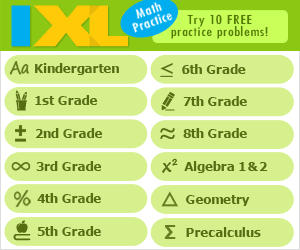7th Grade English Language Arts - Communication Standards
Links verified between 5/23/2014 and 5/26/2014
To work on seventh grade communication standards, click on the numbers below to visit pages of internet resources for each of the learning standards.
Checks for Understanding are at the top of this page. Scroll down to find internet resources related to the State Performance Indicators (SPIs).
Checks for Understanding (Formative/Summative Assessment)
0701.2.1 Follow Instructions - Follow multi-step spoken instructions to perform single tasks, to answer questions, and to solve problems 0701.2.2 Thesis of a Speech - Identify the thesis of a speech in which the main idea may be explicitly or implicitly stated, concepts may be more abstract, and extended metaphors may be used, and determine the essential elements that elaborate it. 0701.2.3 Summarize Information - Summarize information presented orally by others in which the main ideas may be explicitly or implicitly stated, including the purposes, major ideas, and supporting details or evidence. 0701.2.4 Paraphrase - Paraphrase accurately ideas and information presented orally by others. 0701.2.5 Summary and Paraphrase - Construct a summary and a paraphrase of a speech. 0701.2.6 Critique - Construct a critique of a speech. 0701.2.7 Speech Structure - Identify and analyze the structure of a speech (e.g., sequential, chronological, problem-solution, comparison-contrast, cause-effect). 0701.2.8 Listen Actively - Listen actively in group discussions by asking clarifying and elaborating questions and by managing internal (e.g., emotional state, prejudices) and external (e.g., physical setting, difficulty hearing, recovering from distractions) barriers to aid comprehension. 0701.2.9 Support a Thesis - Include relevant facts, reasons, details, and examples to support a relatively complicated thesis. 0701.2.10 Oral Presentation - Organize oral presentations marinating a relatively simple three-part structure, previewing the content of presentation in introduction, offering ideas with supporting details, and providing a brief summary or conclusion. 0701.2.11 Use Organizational Pattern - Use an organizational pattern appropriate for the topic and purpose (e.g., sequential, chronological, problem-solution, comparison-contrast, cause-effect). 0701.2.12 Arrange Ideas - Logically arrange ideas and group related ideas in ways that enhance the topic. 0701.2.13 Transition Strategies - Connect ideas using a variety of transition strategies that signal addition of information and relationships between ideas (e.g., Use listing words such as first, in addition, but, and however). 0701.2.14 Conclusion - Provide an effective conclusion that reinforces the focus of the presentation. 0701.2.15 Presentation Skills - Employ presentation skills such as good eye contact, clear enunciation, effective speaking rate and volume, and natural gestures. 0701.2.16 Teamwork - Participate productively in self-directed work teams for a particular purpose (e.g., to interpret literature, solve a problem, make a decision). State Performance Indicators
SPI 0701.2.1 Purpose of Speech - Identify the purpose of a speech (i.e., to inform, to describe, to explain, to persuade). SPI 0701.2.2 Audience - Identify the targeted audience of a speech. SPI 0701.2.3 Thesis - Identify the thesis and main points of a speech. SPI 0701.2.4 Engage an Audience - Determine the most effective methods for engaging an audience during an oral presentation (e.g., making eye contact, adjusting speaking rate). SPI 0701.2.5 Organize Ideas - Organize ideas in the most effective order for an oral presentation. SPI 0701.2.6 Organizational Pattern - Discern the organizational pattern of a speech (e.g., sequential, chronological, problem-solution, comparison-contrast, cause-effect). SPI 0701.2.7 Team Behavior - Select the most appropriate behaviors for participating productively in a team (e.g., ask primarily relevant questions that move the team toward its goal and contribute to the topic of discussion, articulate the goals that have been provided for the team work and ask clarifying questions, come to agreement by seeking consensus or following the majority). SPI 0701.2.8 Roles Within a Group - Identify the functions and responsibilities of individual roles within an organized group (i.e., reporter, recorder, information gatherer, leader, timekeeper). SPI 0701.2.9 Summary or Critique - Distinguish between a summary and a critique. Review Help Resources to help review Seventh Grade English Language Arts standards
Search Internet4Classrooms

Custom Search






